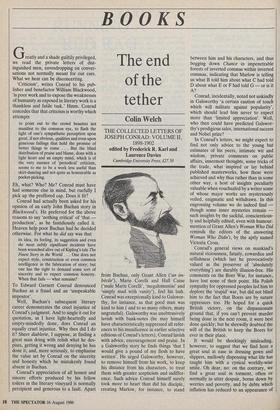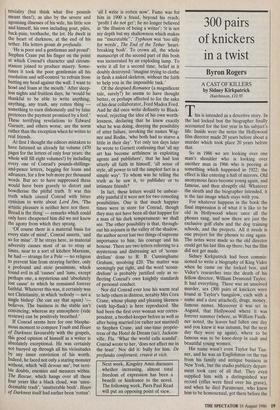BOOKS
The end of the tether
Colin Welch
THE COLLECTED LETTERS OF JOSEPH CONRAD: VOLUME II, 1898-1902 edited by Frederick R. Karl and Laurence Davies
Cambridge University Press, £27.50
Greatly and a shade guiltily privileged, we read the private letters of dist- inguished men, eavesdropping on conver- sations not normally meant for our ears. What we hear can be disconcerting.
'Criticism', writes Conrad to his pub- lisher and benefactor William Blackwood, 'is poor work and to expose the weaknesses of humanity as exposed in literary work is a thankless and futile task.' Hmm. Conrad concedes that that criticism is worthy which attempts to point out to the crowd beauties not manifest to the common eye, to flash the light of one's sympathetic perception upon great, if not obvious, qualities and even upon generous failings that hold the promise of better things to come . . . But the blind distribution of praise and blame, done with a light heart and an empty mind, which is of the very essence of 'periodical' criticism, seems to me to be a work less useful than skirt-dancing and not quite as honourable as pocket-picking.
Eh, what? Who? Me? Conrad must have had someone else in mind, but ruefully I pick up the proffered cap. Does it fit?
Conrad had actually been asked for his opinion of an early John Buchan story in Blackwood's. He preferred for the above reasons to say 'nothing critical' of 'that — production', as he fastidiously called it.
Heaven help poor Buchan had he decided otherwise. For what he did say was that its idea, its feeling, its suggestion and even the most subtly significant incidents have been wrenched alive out of Kipling's tale The Finest Story in the World. . . One does not expect style, construction or even common intelligence in the fabrication of story; but one has the right to demand some sort of sincerity and to expect common honesty. When that fails — what remains?
To Edward Garnett Conrad denounced Buchan as a fraud and an 'unspeakable impostor'.
Well, Buchan's subsequent literary career demonstrates the cruel injustice of Conrad's judgment. And to single it out for quotation, as I have light-heartedly and empty-mindedly done, does Conrad an equally cruel injustice. Why then did I do it? Sheer diablerie, I suppose, at finding a great man doing with relish what he des- pises, getting it wrong and denying he has done it; and, more seriously, to emphasise the value set by Conrad on the sincerity and honesty which he mistakenly found absent in Buchan.
Conrad's appreciation of all honest and sincere efforts produced by his fellow toilers in the literary vineyard is normally percipient and generous to a fault. Apart from Buchan, only Grant Allen ('un im- becile), Marie Corelli and Hall Caine ('male Marie Corelli', 'megalomaniac' and 'simply mad with vanity'), feel his lash. Conrad was exceptionally kind to Galswor- thy, for instance, as that good man was kind to him ( and to so many others, many ungrateful). Galsworthy was unobtrusively lavish with bank-notes (he may himself have characteristically suppressed all refer- ences to his munificence in earlier selective editions of Conrad's letters), Conrad lavish with advice, encouragement and praise. In a Galsworthy story he finds things 'that I would give a pound of my flesh to have written'. He urged Galsworthy, however, to remove himself from his work, to keep his distance from his characters, to treat them with greater scepticism and indiffer- ence. Such advice Conrad himself surely took more to heart than did his disciple, creating Marlow, for instance, to stand between him and his characters, and thus bogging down Chance in impenetrable forests of inverted commas within inverted commas, indicating that Marlow is telling us what B told him about what C had told D about what E or F had told G — or is it A?
Conrad, incidentally, noted not unkindly in Galsworthy 'a certain caution of touch which will militate against popularity', which should lead him never to expect more than 'limited appreciation'. Well, who then could have predicted Galswor- thy's prodigious sales, international success and Nobel prize?
In Conrad's letters, we might expect to find, not only advice to the young but estimates of his peers, intimate wit and wisdom, private comments on public affairs, innermost thoughts, some tricks of the trade, what inspired or lay behind published masterworks, how these were achieved and why thus rather than in some other way, a host of insights peculiarly valuable when vouchsafed by a writer some of whose major works are mysteriously veiled, enigmatic and withdrawn. In this engrossing volume we do indeed find — though some inner mysteries remain — such insights by the sackful, conscientious- ly and helpfully edited, even with humour: mention of Grant Allen's Woman Who Did reminds the editors of the answering Woman Who Didn't, by the aptly named Victoria Cross.
Conrad's general views on mankind's natural viciousness, fatuity, cowardice and selfishness (which last he provocatively valued as the preserver of 'absolutely everything') are durably illusion-free. His comments on the Boer War, for instance, have lost none of their point. His Polish sympathy for oppressed peoples led him to deplore the 'stupid' war, but did not blind him to the fact that Boers are by nature oppressors too. He hoped for a quick British victory, on the dispassionate ground that, if you can't prevent murder being done in the next room, it were best done quickly; but he shrewdly doubted the will of the British to keep the Boers for ever in their place.
It would be shockingly misleading, however, to suggest that we find here a great soul at ease in dressing gown and slippers, mellowly dispensing what life has taught him with a cynical worldly-wise smile. Oh dear, no: on the contrary, we find a great soul in torment, often or normally in utter despair, borne down by worries and poverty, and by debts which inflation has reduced to an appearance of triviality (but think what five pounds meant then!), as also by the severe and agonising illnesses of his wife, his little son and himself, his own including gout, piles, back-pain, toothache, the lot. He dwelt in the heart of darkness, at the end of his tether. His letters groan de profundis.
'He is poor and a gentleman and proud': Stephen Crane put his finger on the point at which Conrad's character and circum- stances joined to produce misery. Some- times it took the poor gentleman all his resolution and self-control `to refrain from butting my head against the wall. I want to howl and foam at the mouth.' After sleep- less nights and fruitless days, he 'would be thankful to be able to write anything, anything, any trash, any rotten thing — something to earn dishonestly and by false pretences the payment promised by a fool.' These terrifying revelations to Edward Garnett, and others worse, are the norm rather than the exception when he writes to real friends.
At first I thought the editors mistaken to have fattened an already fat volume (470 pages for the letters of only four years: the whole will fill eight volumes!) by including every one of Conrad's pounds-shillings- and-pence letters, begging for loans and advances, for a few bob more per thousand words. But no: to have suppressed these would have been gravely to distort and bowdlerise the pitiful truth. It was this truth which caused Conrad with bitter Cynicism to write about Lord Jim, 'The artistic pleasure is neither here nor there. Bread is the thing' — remarks which could only have cheapened him did we not know the agony from which they sprang.
'Of course there is a material basis for every state of mind', Conrad asserts, 'and so for mine'. If he strays here, as material adversity causes most of us to stray at times, near to a sort of kitchen Marxism, he had — strange for a Pole — no religion to prevent him from straying further, only a profound and stoic pessimism, which found evil in all 'causes' and 'isms, except perhaps one, a mysterious and 'absolutely lost cause' to which he remained forever faithful. Whatever this was, it certainly was not Christianity, in which 'nobody — not a single bishop' (he can say that again) '- believes. The business in the stable isn't convincing; whereas my atmosphere (vide reviews) can be positively breathed.'
If Conrad seems here for one blasphe- mous moment to compare Youth and Heart of Darkness favourably with the gospels, this good opinion of himself as a writer is absolutely exceptional. He was certainly not buoyed up through all his vicissitudes by any inner conviction of his worth. Indeed, he faced not only a staring monster without, which 'will devour me', but terri- ble doubts, enemies and menaces within. The Rescue, which hangs over all these four years like a black cloud, was 'unre- deemable trash', 'unutterable bosh'. Heart of Darkness itself had earlier been 'rotten': 'all I write is rotten now'. Fame was for him in 1900 a fraud, beyond his reach; 'profit I do not get'; he no longer believed in 'the illusion of being a writer'; 'it is not my depth but my shallowness which makes me "inscrutable".' Typhoon was 'too silly for words', The End of the Tether 'heart- breaking bosh'. To crown all, the whole manuscript of the second part of this bosh was incinerated by an exploding lamp. To write it all for a second time, belief in it doubly destroyed: 'imagine trying to clothe in flesh a naked skeleton, without the faith to help you in the impossible task.' Of the despised Romance (a magnificent tale, surely?) he seems to have thought better, or perhaps affected to for the sake of his dear collaborator, Ford Madox Ford. And he did once write defiantly to Black- wood, rejecting the idea of his own worth- lessness, declaring that he knew exactly what he was doing, denying the possibility of utter failure, invoking the names Wag- ner and Rodin, 'who both had to starve a little in their day'. Yet only ten days later he wrote to Garnett confessing that 'all my art has become artfulness in exploiting agents and publishers', that he had lost utterly all faith in himself, 'all sense of style, all power to tell the simplest fact in a simple way'. To whom was he telling the truth as he saw it, to publisher or to intimate friends?
In fact, these letters would be unbear- ably painful if it were not for two consoling possibilities. One is that much happier times were in store for Conrad, though they may not have been all that happier for a man of his dark temperament: we shall see. The other possibility is that, through- out his sojourn in the valley of the shadow, the author never lost two things of supreme importance to him, his courage and his honour. There are two letters referring to a mysterious and distressing act of `scoun- drelism' done to R. B. Cunninghame Graham, involving £20. The matter was seemingly put right, and the word `scoun- drelism' is probably justified only as re- flecting Conrad's own knightly standards of personal conduct. Nor did Conrad ever lose his warm zeal to help others in distress, notably Mrs Cora Crane, whose plump and pleasing likeness (with hip-flask) is here reproduced. She had been the first ever woman war corres- pondent, a brothel-keeper before as well as after being married (or rather not married) to Stephen Crane, and one-time proprie- tress of the Hotel de Dream (sic), Jackson- ville, Fla. 'What the world calls scandal', Conrad wrote to her, 'does not affect me in the least'. Nor did it: bully for him. De profundis confortavit, creavit et vicit.











































 Previous page
Previous page